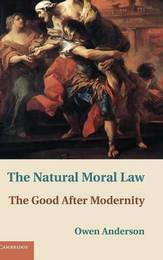
|
The Natural Moral Law: The Good after Modernity
Hardback
Main Details
| Title |
The Natural Moral Law: The Good after Modernity
|
| Authors and Contributors |
By (author) Owen Anderson
|
| Physical Properties |
| Format:Hardback | | Pages:320 | | Dimensions(mm): Height 229,Width 152 |
|
| Category/Genre | Ethics and moral philosophy |
|---|
| ISBN/Barcode |
9781107008427
|
| Classifications | Dewey:340.112 |
|---|
| Audience | | Tertiary Education (US: College) | |
|---|
|
Publishing Details |
| Publisher |
Cambridge University Press
|
| Imprint |
Cambridge University Press
|
| Publication Date |
30 April 2012 |
| Publication Country |
United Kingdom
|
Description
The Natural Moral Law argues that the good can be known and that therefore the moral law, which serves as a basis for human choice, can be understood. Proceeding historically through ancient, modern and postmodern thinkers, Owen Anderson studies beliefs about the good and how it is known, and how such beliefs shape claims about the moral law. The focal challenge is whether the skepticism of postmodern thinkers can be answered in a way that preserves knowledge claims about the good. Considering the failures of modern thinkers to correctly articulate reason and the good and how postmodern thinkers are responding to these failures, Anderson argues that there are identifiable patterns of thinking about what is good, some of which lead to false dichotomies. The book concludes with a consideration of how a moral law might look if the good is correctly identified.
Author Biography
Owen Anderson is an Associate Professor at Arizona State University. He teaches philosophy and religious studies. His main classes are 'Philosophy of Religion', 'Ethics', 'Religion in America' and 'World Religious Traditions'. He is the author of Reason and Worldviews and The Clarity of God's Existence.
Reviews"Owen Anderson's fine book advances the discussion of natural law in contemporary philosophy. One finds between its covers careful, rigorous thinking and lucid writing. It is a valuable contribution to the debate about moral reasoning." -- Robert P. George, McCormick Professor of Jurisprudence, Princeton University
|